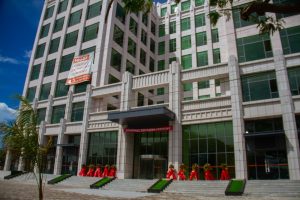Worldveg Introduces Rootstock Lines To Empower Tomato Farmers
By Valentine Oforo
IN EFFORTS to
improve performance of the tomato sub-sector, the World Vegetable Center (Worldveg) has developed and screened
eggplant and tomato rootstock lines for resistance reaction for Tanzanian
ralstonia solanacearum strains in greenhouse.
It has been unveiled that, in Tanzania, between 40
to 100 percent of tomato yield loss is due to bacterial wilt disease, primarily
caused by ralstonia solanacearum species complex, and an important disease of
solanaceous crops such as tomatoes, peppers, eggplants, potatoes, nightshade
and watermelon.
The
helpful development, among others, focuses on empowering the tomato
growers to overcome negative effects of the sector’s prone
diseases that have been often thwarting the farmers to yield bumper
crops.
Ralstonia solanacearum (bacterial wilt) is a
bacterium that causes wilting and death of solanaceous plants like potato and
tomato.
According to Dr. Judith Hubert, a Plant Pathologist
at the Arusha-based viggie center, to start with, the helpful rootstock lines
have been introduced in Zanzibar through the Accelerated Innovations Delivery
Initiative (AIDI) Zanzibar CIMMYT project.
“The robust project, AIDI which commenced in March
2023 has so far managed to introduce and upscaling grafting technology
transfer and distribution of resistant rootstocks to at least 80 farmers in Unguja
and Pemba,” she explained.
And Dr Hubert added, implementation of the crucial
project in the archipelago of Zanzibar was part to ensure an alternative to
harmful pesticides, whereby planting resistant rootstocks are effective and environmentally-friendly
management strategies.
“Through execution of the initiative, majority of farmers in Zanzibar are currently managing to to grow tomatoes successfully, as
well as many vegetables with better management and improved yields,”
she informed.
Due to the so far attained successes, Dr Hubert
unveiled that plans are afoot to extend the project into several regions of
Tanzania mainland in order to support the tomato farmers, come next year.
“Through professional collaboration between
Worldveg, IFDC, CIMMYT and local partners, implementation of the project has
managed to fetch intended end-results of attaining sustainable solutions and
community empowerment, being essential elements in combating malnutrition and
enhancing overall well-being,” she expressed.
Dispensing under the key theme of ‘Sowing Seeds,
Meeting Seeds’ Worldveg which recently celebrated 50 years anniversary of it
excelling performance launched its mission in 1992 in Arusha, Northern Tanzania
and today the center has professional research and development staff working
across Africa on important vegetable crops such as tomato, pepper, onion and
cabbage, as well as a range of African traditional vegetables, and partners
with more than 40 national institutions and many international organizations.
The Center operates three regional bases in Africa:
in Tanzania for Eastern and Southern Africa, in Mali for West and Central
Africa – Dry Regions (established 2014), and in Benin for West and Central
Africa – Coastal and Humid Regions (2017). There is a liaison office in
Cameroon to reach into sub-Saharan Africa with improved vegetable varieties and
production technologies.













